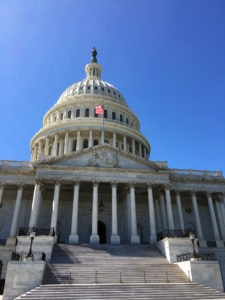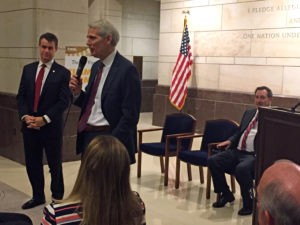 Today, the Indiana General Assembly reconvenes to pass five bills; four had been through the entire process during the regular session that ended on March 14 and were ready for final passage.
Today, the Indiana General Assembly reconvenes to pass five bills; four had been through the entire process during the regular session that ended on March 14 and were ready for final passage.
To use a basketball metaphor to describe the situation with these bills: The ball was still in the shooter’s hands when the shot clock went off. And the bills to be taken up in the special session will substantively be the same bills that were making their way down court in the final minutes of regulation. The only other bill is a technical corrections measure to reconcile inadvertent conflicts in language of bills that passed – i.e., two bills amending the same section of the code, but with slightly different wordage. Such technical corrections bills are routine.
As we reported last month, there are two tax administration bills. House Bill 1316 – the one to update Indiana with the federal tax reform changes – is both significant in effect and time sensitive. Failure to pass this legislation would greatly complicate 2018 returns and be of substantial consequence to Indiana and its taxpayers. Meanwhile, Senate Bill 242 includes a number of provisions the Indiana Department of Revenue sought to improve tax administration.
The remaining two bills are in the education realm: one addressing school safety issues and the other involving state oversight of financially distressed school systems – often regarded as the Muncie and Gary schools bill. There are lingering disagreements attached to the provisions of the latter legislation (testimony was heard earlier this week by the Legislative Council), and it will reignite debates that were had during the regular session. But it is expected that the time allotted for rehashing these debates will be limited.
Given the timeframe, there is little for legislators to do except formally act on the five bills. That leads us to the question: Will they in fact get all their work done in a single day? Probably so, once they suspend most of the rules that would, if applied, serve only to prolong the proceedings.
Separately, it appears there is some other significant business to be conducted by the Senate while they are all in town. Rumor has it that the following day (May 15) will be devoted to some serious internal politics. That would be the selection of a new Senate Pro Tempore to replace the retiring Sen. David Long (R-Fort Wayne). Talk is of a “binding straw poll” seeking to lock members into a statement of who they intend to support when a formal vote is taken in November, after the fall election. Senators Rod Bray (R-Martinsville) and Travis Holdman (R-Markle) are the acknowledged frontrunners for the Senate leadership post.


 More than 100 of the state’s top business leaders descended on D.C. this week for the Indiana Chamber’s Fly-in event with our congressional delegation.
More than 100 of the state’s top business leaders descended on D.C. this week for the Indiana Chamber’s Fly-in event with our congressional delegation.
 This year, legislative briefings will be conducted by congressional members, who will be highlighting key public policy areas that line up with their committee assignments and expertise:
This year, legislative briefings will be conducted by congressional members, who will be highlighting key public policy areas that line up with their committee assignments and expertise: